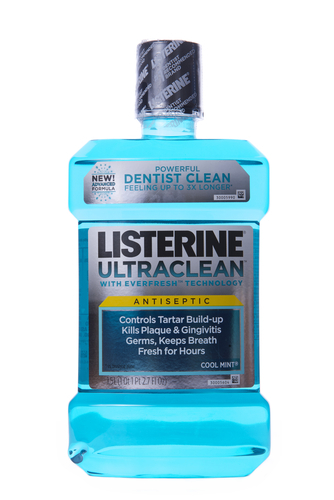Short answer
Yes, Listerine can be bad for you. Alcohol-based mouthwashes may cause irritation to gums/canker sores, intoxication and have been linked to oral cancer. There are safer ways to keep your smile bright and your breath fresh.
Long answer
Listerine has been around for a long time, serving many different purposes. It was originally introduced as a surgical antiseptic in 1879. A decade later, Listerine found greater success when it was re-positioned for oral health and marketed to dentists. In 1895, it became the first over-the-counter mouthwash sold in America.
Present-day formulations of Listerine include essential oils such as menthol, thymol, methyl salicylate, and eucalyptol. When combined, these essential oils work as an oral antiseptic; methyl salicylate has also been shown to reduce gum inflammation. However, these ingredients occur in very small quantities (0.092% being the highest). The most prominent ingredient in Listerine is ethanol alcohol: it makes up 21.6% of the flavored variety and a 26.9% of the original gold formulation. But it takes an alcohol concentration of 40% or higher to kill bacteria—so what purpose does it serve here?
Alcohol is added to Listerine to dissolve the essential oils and help the mouthwash penetrate plaque more effectively. And that’s about it. The Journal of Clinical Periodontology reports that alcohol offers no added benefits in fighting gingivitis or gum disease, but it can cause irritation—particularly for those who have a dry mouth or canker sores.
Alcohol can also lead to intoxication. Of course, you’re not supposed to drink Listerine: it says so right on the bottle. However, people do drink Listerine to get drunk, especially alcoholics and teenagers. Since the mouthwash contains other potentially toxic ingredients which were never meant to be consumed, it is very dangerous to ingest. Drinking too much Listerine has led to seizures... and even death. So if you are a recovering alcoholic, or if you are a parent to teens, it might not be the best idea to keep Listerine in your home.
Lastly, some studies have linked alcohol-based mouthwash to oral cancer. More research is needed to develop a definite correlation; the findings in these studies aren’t significant enough to worry most health professionals just yet... but it’s definitely something to keep an eye on.
Want to reduce your risk? Pick a different mouthwash, such as Oral Essentials Mouthwash, which is free of alcohol and other potentially harmful ingredients like artificial colors and preservatives. Love Listerine? Switch to a variety with a lower concentration of alcohol... or better yet, pick up alcohol-free Listerine. No matter what kind you choose, you should also limit your mouthwash usage to no more than twice a day. Some of the studies previously mentioned suggested that more frequent mouthwash users showed an elevated risk of developing oral cancer.
Possible short-term side effects
- irritated gums/sores
- alcohol intoxication (if swallowed)
Possible long-term side effects
- oral cancer
Ingredients to be aware of
- artificial colors sucralose
- sodium benzoate
- sodium saccharin
- alcohol

Benefits
- freshens breath (temporarily)
- reduces gum inflammation
- decreases cavities
- reduces plaque
 Approved by
Approved by 















